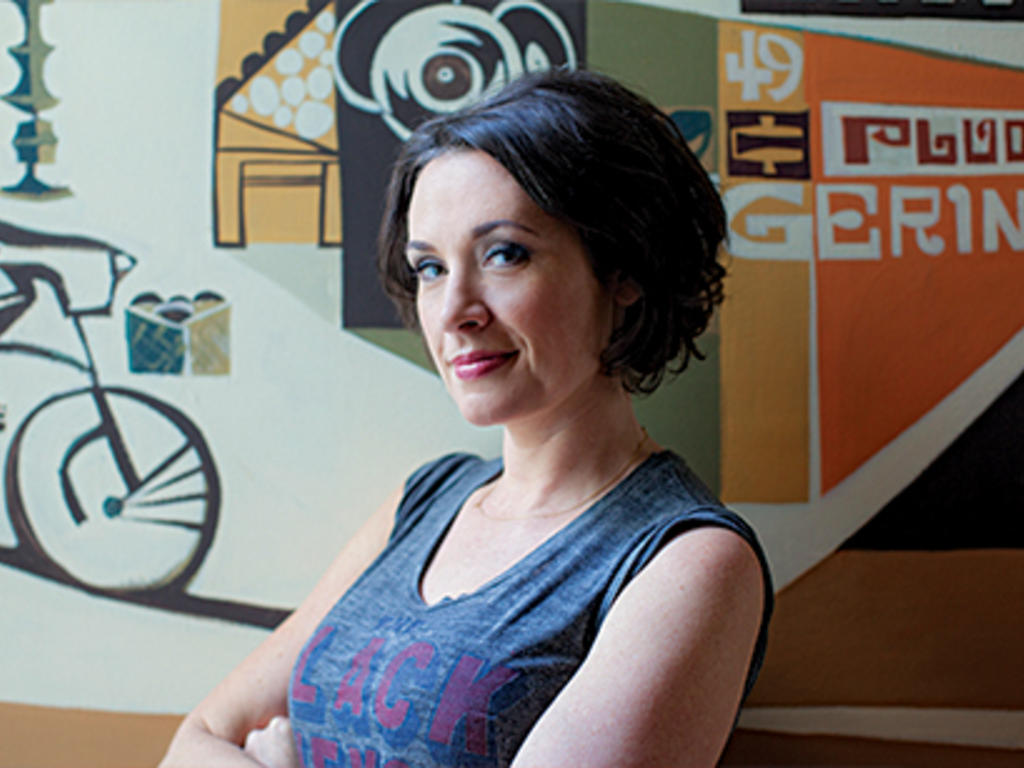In February, a group of Rhodes students and faculty attended a Google+ Hangout On Air question-and-answer session with Sarah Lacy ’98, founder of PandoDaily, a website dedicated to coverage of Silicon Valley. Moderating the event was Evan Katz ’15. (For more on Katz, see page 35.) Below are excerpts from the Q&A session. For the full interview, please go to rhodes.edu/magazine/Lacy_interview.
Evan Katz: Sarah, you visited Rhodes a few years ago and talked to students about your early career aim to write a book. Could you elaborate a little on that for our Hangout audience while also catching us up on how you started PandoDaily?
Sarah Lacy: Sure. So, I went to Rhodes—my Dad taught philosophy there—and it was a great place for me. Toward the end, like probably a lot of college kids, I felt lost and confused, so I took a semester off and got an internship with the Memphis Business Journal, which turned into a job with the Memphis Business Journal, which turned into an opportunity to move out to Silicon Valley to work for the San Jose Business Journal in 1999. This was the peak of the dot-com boom, when Silicon Valley was the most exciting place to be. I’d been covering finance at the Memphis Business Journal and really fell in love with start-ups and venture capital, and the opportunity to go to the epicenter was an amazing opportunity. Then I went to Business Week. I did a cover on the rise of the consumer Internet again and Web 2.0, which was one of the first big national magazine covers about Facebook and Digg and LinkedIn and Yelp and YouTube. That turned into a book deal (Once You’re Lucky, Twice You’re Good: The Rebirth of Silicon Valley and the Rise of Web 2.0, Gotham Books, May 2008), so I quit Business Week to write my first book, and then I hosted a show for Yahoo Finance. I wrote a second book (Brilliant, Crazy, Cocky: How the Top 1% of Entrepreneurs Profit from Global Chaos, Wiley, February 2011) about entrepreneurship in emerging markets. About three years ago, I took my newborn baby fund-raising with me, raised $2.5 million, and I started PandoDaily.
EK: What attracted you to business writing early on, first in Memphis at the Business Journal and, later, for Business Week?
SL: I majored in international studies initially, but I found what I really missed was studying and tearing apart and digesting literature. I loved just being able to digest and pick apart and read between the lines and see meanings behind things. And I think that really did prepare me to be a journalist—more than going to journalism school would have, because a lot of what I’m trying to do is see the truth behind what people are telling me, particularly as a business reporter, because things that we write regularly affect millions, if not billions, of dollars of market value for companies.
EK: We are talking in great detail in the Rhodes community this year about the value of a liberal arts education. What does that claim of value mean to you? How do you translate that into your daily life or work life?
SL: I do think that all industries are changing so rapidly. Who would have thought a couple of years ago that transportation would be a sexy industry—and, yet, the highest valued private company in Silicon Valley is Uber, a transportation company. Everything is getting completely remade, and you’re seeing that a lot of people building these companies are people with a liberal arts education. Chad Dickerson, who is the head of Etsy, is a big believer in liberal arts education. I just interviewed Stewart Butterfield, who is the head of Flickr—a billion dollar company—and he was a philosophy major. I think Peter Thiel was a philosophy major. I always remember the philosophy majors because my dad taught philosophy. If they are not math-based engineers, I know more CEOs in the Valley that are liberal arts majors than not. I think there are a couple of reasons why. One is because these industries are changing so rapidly that if you study to be a lawyer, even go to journalism school—something that is very vocational based—you’re kind of pigeon-holed in that. Whereas, if you have a liberal arts degree, you know how to communicate with people, you know how to structure things, you know how to write.
EK: If you are coming out of college and you think you want to start a company, should you get a job before you start that company? Is that going to give you valuable experience and maybe some financial padding?
SL: It totally depends on the person, and it totally depends on the opportunity. If you have an amazing opportunity right now and you feel passionate about it, you should just go do it. The problem with getting a job is, if you want a job in the industry and get too invested in that industry, you can’t see it through fresh eyes. And you go in and you think you’re going to build a financial cushion, and that just never happens. So, if that’s your reason, don’t do it. If it’s to get some experience, certainly, you are a better boss if you have worked for other bosses. But I think it depends on the industry. For me, there is no way I could have done this company right out of school.
